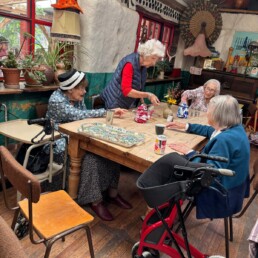Sleep and Ageing: How to Promote Restful Nights in Later Life
As we age, the quality and patterns of our sleep naturally change. Older adults often find themselves waking frequently during the night or struggling to fall asleep. In care home environments, this can be especially challenging—but also an area where thoughtful support can make a significant difference.
Why Sleep Changes with Age
Biological changes, reduced melatonin production, increased frequency of medical conditions, and the side effects of certain medications can all impact sleep. Emotional factors such as anxiety or depression, often heightened during times of transition or illness, can also contribute to poor sleep.
The circadian rhythm, our internal body clock, tends to shift with age, often making older adults feel tired earlier in the evening and wake earlier in the morning. However, the quality of sleep may be lighter and more fragmented, resulting in less restorative rest.
Consequences of Poor Sleep in Older Adults
Sleep deprivation in the elderly can lead to irritability, cognitive decline, greater risk of falls, and a weakened immune system. Chronic sleep issues may also exacerbate other health problems, making rest an essential part of holistic elderly care.
Insufficient sleep is also linked to cardiovascular disease, diabetes, and even an increased risk of dementia. For residents in care homes, addressing sleep issues is a preventative health strategy as well as a comfort-enhancing measure.
Creating a Sleep-Friendly Environment in Care Homes
- Routine and Structure: Encourage a regular bedtime and wake-up schedule, as consistency helps regulate the circadian rhythm.
- Lighting: Use natural light during the day to help maintain healthy sleep-wake cycles, and dim lighting in the evening to cue the body for rest.
- Noise Reduction: Maintain quiet nighttime environments with minimal disruptions. Use soft flooring, close doors gently, and avoid overhead paging systems.
- Comfortable Bedding: Ensure mattresses and pillows are suited to the individual’s needs. Weighted blankets can also promote calm for some individuals.
- Temperature Control: Keep bedrooms comfortably cool and well-ventilated.
Daytime Habits to Support Night-Time Sleep
- Promote physical activity and fresh air during the day.
- Limit daytime napping to avoid nighttime wakefulness, ideally keeping naps under 30 minutes.
- Encourage engagement in meaningful activities to promote emotional wellbeing and mental stimulation.
- Avoid caffeine and heavy meals late in the day.
Nutrition and Hydration
Evening snacks such as bananas, almonds, or chamomile tea can help promote sleep. Ensure residents are well-hydrated but avoid large fluid intake right before bed to reduce nighttime bathroom visits.
When to Seek Medical Support
If sleep issues persist, involve a healthcare professional. Sleep disorders like sleep apnoea, restless leg syndrome, or periodic limb movement disorder may require specialised care. Medication reviews can also reveal drugs that disrupt sleep as a side effect.
Conclusion
Promoting better sleep in older adults isn’t just about comfort—it’s about quality of life. At Shipston Lodge, we understand the profound link between restful nights and overall wellbeing. With the right support and a tailored approach, we help ensure every resident enjoys peaceful, restorative sleep.
Related News
Check out our August Social Media posts
Afternoon Delights at Wychford Potteries & Café! What a…
Using Aromatherapy and Natural Remedies in Care Settings
Using Aromatherapy and Natural Remedies in Care Settings Incorporating natural remedies into care…
Emergency Preparedness in Care Homes: Keeping Residents Safe
Emergency Preparedness in Care Homes: Keeping Residents Safe In a care home setting, safety is not…
Check out our July Social Media posts
Musical Fun with Kidley Divey We had a fantastic and energetic…
Why Location Matters: The Benefits of Life in the Heart of Shipston-on-Stour
Why Location Matters: The Benefits of Life in the Heart of Shipston-on-Stour The location of a…
Staying Connected: How Shipston Lodge Helps Families Stay Close
Staying Connected: How Shipston Lodge Helps Families Stay Close Moving into a care home is a…
Life Stories and Legacy: Celebrating Residents’ Histories at Shipston Lodge
Life Stories and Legacy: Celebrating Residents’ Histories at Shipston Lodge At Shipston Lodge, we…
Adapting to Changing Needs: How Shipston Lodge Evolves with Each Resident
Adapting to Changing Needs: How Shipston Lodge Evolves with Each Resident At Shipston Lodge, we…
Creating Moments of Joy: The Role of Laughter and Play in Elderly Wellbeing
Creating Moments of Joy: The Role of Laughter and Play in Elderly Wellbeing Laughter is more than…
Empowering Independence: How Shipston Lodge Supports Choice and Autonomy
Empowering Independence: How Shipston Lodge Supports Choice and Autonomy Independence is something…
Check out our June Social Media posts
https://shipstonlodge.co.uk/wp-content/uploads/2025/06/Veronica-The-Dog.mp4……
Creating a Truly Welcoming Community for Families at Shipston Lodge
Creating a Truly Welcoming Community for Families at Shipston Lodge At Shipston Lodge, exceptional…











